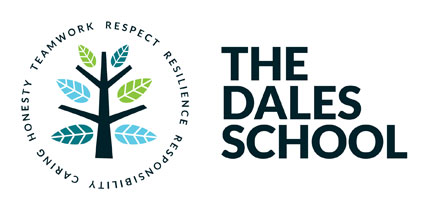The Dales School is a special school which caters for children with a variety of complex needs. These include:
- Language and learning difficulties
- Autism
- Attention deficit hyperactivity disorder (ADHD)
- Behavioural problems
- Social, emotional and mental health needs (SEMH).
The intent of our curriculum is to equip all pupils with the skills and knowledge they need to be effective learners so they may have as happy, fulfilled and successful futures as possible.
Our Curriculum:
- Meets the needs of children with a wide range of aptitudes and abilities
- Is broad and balanced
- Includes an emphasis on Life Skills and Basic Skills
- Includes methods and approaches that meet the needs of each individual child
- Supports the outcomes described in each child’s Education, Health and Care Plan (EHCP).
Our curriculum model aims to:
- Maximise each pupil’s engagement
- Support outstanding progress across all areas of learning
- Provide motivating and relevant learning opportunities and developmental activities
- Adopt a personalised approach that allows staff to plan in response to a pupil’s individual needs and interests and take into account their barriers to learning
- Use a combination of Life Skills and Basic Skills to ensure that pupils are well prepared for the next phase of their education
- Lay the foundations for pupils to have a meaningful and independent adult life and are well-placed to make a positive contribution to life beyond school
- Base learning opportunities on real-life experiences in engaging, cross-curricular, innovative, and stimulating and inspiring ways
- Promote pupils to engage, participate and try hard
- Provide children with the foundations for learning so that they can achieve and progress at their own pace
- Develop essential Life Skills throughout each day and learn Basic Skills, based on the specific areas of learning described in Early Years, Foundation Stage (EYFS), in every session.
Curriculum planning should:
- Be highly focused on communication and interaction through a language rich environment and well-planned play, continuous provision and learning activities
- Focus on play and cross-curricular learning opportunities in order to embed essential early learning skills in an inclusive and holistic way
- Provide opportunities to generalise skills across a range of contexts
- Aim to develop our pupils by providing well-planned, trans-disciplinary sessions that maximise engagement, achievement and progress
- Use outdoor learning experiences so that children learn within real world contexts
- Use educational visits or external visitors to motivate and engage learners.
Assessment should be accurate, precise and used to clearly identify:
- Attainment and progress of Life Skills, Basic Skills and subject specific learning
- Pupils’ stages of development and learning
- Appropriate next steps that allow pupils to access meaningful, appropriate and well-differentiated learning opportunities.
|
| What Life Skills do we intend pupils to develop? |
|
Behaviours for Learning
Staff will encourage and support pupils to:
- Engage in learning opportunities and maximise progress and achievement
- Follow basic rules and expectations by using a consistent and positive approach to attitudes and behaviour
- Develop self-esteem and confidence across all areas of learning
- Develop each child’s resilience and thinking skills
- To achieve and succeed with a ‘can do’ attitude that reduces barriers to learning.
Communication
Staff will encourage and support pupils to:
- Learn effectively and interact appropriately
- Increase their ability to speak, listen and understand
- Increase their receptive, expressive and pragmatic language skills
- Develop appropriate social communication.
Personal Independence
Staff will encourage and support pupils to:
- Develop life skills including self-care and personal organisation within the scope of their needs and abilities
- Understand personal safety and how to stay safe in a range of environments
- Access formal and informal learning opportunities as independently as possible.
Relationships and Social Skills
Staff should encourage and support pupils to
- Develop play skills and effective social communication with peers and adults within the scope of their needs and ability
- Understand the basic foundations of positive relationships, including how to form and maintain friendships
- Understand appropriate social behaviour.
|
| What Basic Skills do we intend pupils to develop? |
|
Basic Skills are derived from the EYFS specific areas of Learning and Development. These skills are the building blocks for, and underpin, successful future learning. They are transferable and need to be practiced in a range of contexts, environments and situations. All our pupils require many opportunities every day to develop their basic skills in a range of learning opportunities that are appropriate for their needs, abilities and rates of progress.
Basic skills include:
Literacy
Mathematics:
- Numbers
- Shape, space and measures
Understanding My World
- Science
- Humanities
- Technology / Computing
Creativity and Imagination:
|
| Subject Specific Learning |
|
All subject specific learning is based on The National Curriculum. It is largely delivered in ‘themes’ that allow balance and breadth across the curriculum. Pupils access these themes at a level appropriate to their attainment, development, needs and rate of progress.
Subject specific learning is important, but we believe that the Life Skills and the Basic Skills that our pupils need to be successful learners is more important. For this reason, we emphasise Life Skills across the whole school day and Basic Skills are practiced in every lesson. Subject specific learning is targeted in lessons as appropriate to the theme and needs of each child. |
For more information about our Curriculum, please contact us using the details here.

